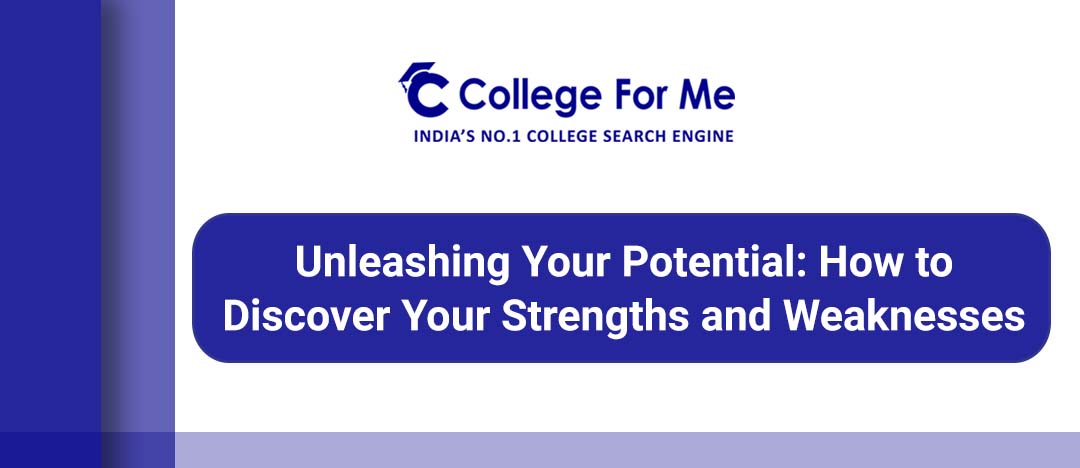Career Scopes Of A B.Tech. Student
There is a high demand for B.Tech. degree holders in the private sector, yet, there is also the opti...

College is a transformative period in one's life, offering numerous opportunities for personal and professional growth. As you embark on this journey, it becomes crucial to identify and leverage your strengths while acknowledging and improving upon your weaknesses. Self-awareness is key to self-improvement and success.
In this article, we will explore effective strategies to help college students discover their strengths and weaknesses, empowering them to make informed decisions and navigate their academic and personal lives more effectively.
Engage in Self-Reflection:
The first step towards discovering your strengths and weaknesses is engaging in self-reflection. Take the time to introspect and understand your values, passions, and interests. Consider what activities make you feel fulfilled and energized. Reflect upon your past achievements and moments where you felt confident and accomplished. Identifying patterns in your experiences can provide valuable insights into your strengths.
Seek Feedback:
While self-reflection is crucial, it is equally important to seek feedback from others. Reach out to professors, mentors, friends, and family members who know you well and can offer objective perspectives. Their insights can shed light on your strengths that you might not have noticed or underestimated. Additionally, they can provide constructive criticism to help you identify areas where you can improve.
Try New Experiences:
Stepping out of your comfort zone and engaging in new experiences can be an excellent way to discover your strengths and weaknesses. Join clubs, organizations, or sports teams that align with your interests. Participate in internships or part-time jobs that expose you to different environments and challenges. These experiences allow you to explore various skills and uncover hidden talents, as well as identify areas where you may need further development.
Conduct Self-Assessment Tests:
There are various self-assessment tools available that can assist in uncovering your strengths and weaknesses. Personality assessments, such as the Myers-Briggs Type Indicator (MBTI) or the Big Five Personality Traits, can provide insights into your behavioral tendencies and preferences. Strengths-based assessments, such as the CliftonStrengths assessment, can identify your natural talents and areas where you excel. These assessments serve as valuable starting points for self-discovery and self-awareness.
Embrace Failure and Learn from Setbacks:
Failure and setbacks are an inevitable part of life. Instead of being discouraged by them, embrace failure as an opportunity for growth. Analyze your failures objectively and identify the areas where you fell short. Embracing a growth mindset allows you to learn from your mistakes, adapt, and improve. By recognizing your weaknesses, you can work towards developing strategies to overcome them and turn them into strengths.
Reflect on Your Academic Performance:
Your academic journey provides valuable insights into your strengths and weaknesses. Reflect on the subjects or courses where you excel and enjoy studying. Identify the skills required to succeed in those areas and leverage them further. Similarly, analyze the subjects that challenge you the most and the reasons behind it. It could indicate areas where you need to put in extra effort or seek additional support.
Leverage Technology and Online Resources:
In today's digital age, numerous online resources and tools can help you discover your strengths and weaknesses. Explore career assessment platforms, such as Sokanu or MyNextMove, which can provide insights into your aptitudes and suggest career paths aligned with your strengths. Online learning platforms, such as Coursera or Udemy, offer a wide range of courses that allow you to develop new skills and explore areas of interest.
Conclusion: Discovering your strengths and weaknesses is a lifelong journey, and college is an ideal time to embark on this exploration. By engaging in self-reflection, seeking feedback, trying new experiences, utilizing self-assessment tools, embracing failure, reflecting on academic performance, and leveraging technology and online resources, college students can gain a deeper understanding of their unique abilities and areas for improvement. Armed with this knowledge, they can make informed decisions, pursue meaningful careers, and lead fulfilling lives. Remember, self-awareness is the key to unlocking your full potential.

There is a high demand for B.Tech. degree holders in the private sector, yet, there is also the opti...

If you are looking for a bright and prospective career, then getting a B.Tech. in CSE must be under ...
Comments (0)